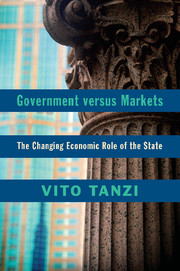Book contents
1 - General Introduction and Main Issues
Published online by Cambridge University Press: 07 October 2011
Summary
Introduction
Perhaps there is no more fundamental question in economics than the economic role that the state – or, less precisely, the government – ought to play in a democratic country with a market economy. This question recently became more urgent in view of the economic and financial crises that, just like earlier crises, stimulated many calls for more governmental intervention. This intervention was justified mostly by so-called Keynesian principles – that is, by the need to provide a boost to the weak economies. However, there were also calls for more, or better, government regulation, especially of financial markets. When governmental intervention comes through higher spending and higher taxes, as it often does, it can change for future years the economic role of the state and the status of a country's public finances.
Some observers have argued that, at least in some countries, and especially in the United States, there had been too little state intervention, especially in recent years. What is obvious from observations of historical developments and from available statistical evidence for many countries is that the economic role of the state is not fixed either in time, for the same countries, or in place, across different countries. Furthermore, at any one time or place, there is little agreement among economists and among observers in general on what that role ought to be. Therefore, the optimal role of the state continues to be a permanent and major topic of discussion in practically all countries rich and poor.
- Type
- Chapter
- Information
- Government versus MarketsThe Changing Economic Role of the State, pp. 3 - 36Publisher: Cambridge University PressPrint publication year: 2011



